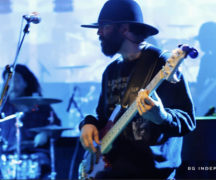By DAVID DUPONT
BG Independent News
If you’re a fan of bluesman Eric Steckel, you can thank his Uncle Dave.
Steckel, who grew up in Pennsylvania, didn’t have instruments around this house. He did hear the soundtrack of his parents’ vinyl collection. His mother and father bonded over their taste for Deep Purple and the Allman Brothers. Then on a trip to visit his uncle and aunt in Stowe, Vermont, the family visited music store. Young Steckel lit up. “I completely changed. I was at home,” the now 28-year-old said in a telephone interview this week.
So his uncle suggested he and Steckel’s dad split the cost of a Stratocaster for the youngster, a guitar he’s only recently retired.
Three years later Speckel recorded his first blues record, music influenced by the records his parents spun around the house.
Steckel hasn’t stopped playing or developing since then.
He now calls his style blues metal, a term coined in jest, that has stuck, became a hashtag, and serves as an apt description for what listeners hear in his performances.
Steckel will appear tonight (Friday, Sept. 14) at 9:30 p.m. Howard’s Club H. Cover is $5.
He explained blues metal as a style derived from “my heroes,” the Kings of the blues — Albert, Freddie, and B.B. — with “a big massive sound, almost a heavy metal sonically.”
He said it took him years and years of playing to find his own voice within the tradition. “It’s this natural beautiful thing that happens. Every night you’re developing.”
Everyone he encounters, everything he hears, everything that comes out of his guitar “comes together into this big pot stew, and that becomes your recipe.”
He said as a young musician he got a lot advice from people who wanted him to stay true to the traditional blues sound.
“I had this sound, this vision, in my head that wasn’t translating. At a certain point, I said I was going to throw out the rule book and find what I heard in my head. It took a lot of trial and error, and I found it.” That was about six years ago.
Steckel is buoyed by the sales of his most recent album “Polyphonic Prayer,” which is outpacing any of his previous recordings.
Like his other recordings, he financed this one himself. He’s rejected deals from record companies including Universal’s European wing. They offer “360” deals, which means they get a cut of everything he does and has done, regardless of their involvement in the project.
Recordings still play a role in his career. “The CD form is a dying medium.” But fans still want new music, and recordings are “a way showing your public this is where I am; this is what I think; what I’m feeling — what I sound like now.”
Older fans still want that physical product. Younger fans are likely to listen through streaming services.
He finds his fan base, especially in the US, to be split. He’s popular with blues fans 45 and older, and guitar-heads in their teens. His own generation, he said, grew up more on hip-hop and related styles, and the guitar-based styles got lost.
In Europe, though, “it’s a whole different story. It’s very colorful.”
That explains why he tours about a third of the year on the other side of the pond. Europe has been important to him from the early days of his career when legend John Mayall took him under his wing and brought him to Europe with the Bluesbreakers as a 12-year-old.
That was conscious decision on Mayall’s part to introduce the young Steckel to the vibrant, and more lucrative, European scene. “I really owe him. We built it up there. This style of music is still part of popular culture.”
Steckel uses social media and digital platforms “to get asses in the seats. Using those tools is a great way to do it.”
Seeing him live is where listeners discover what Steckel is all about. “I want people who come to hear me to say: ‘that really blew my expectations away.’”





